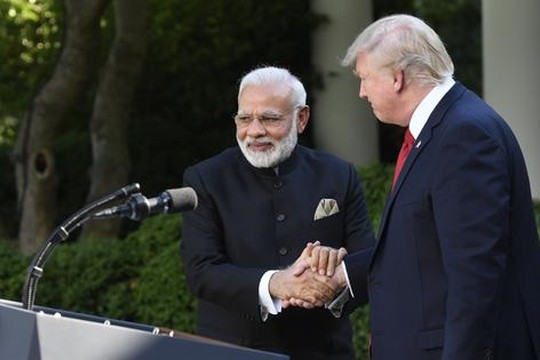Trump and Modi.
Photo: AP
Donald Trump became the first U.S. president since Grover Cleveland in 1893 to be reelected after losing a previous reelection,
The influential CEO of the Chicago Council on Global Affairs Ivo Daalder, who was the US ambassador to NATO, succinctly captured the imminent power shift in DC when he wrote in Politico, “Trump won in a landslide. He helped Republicans take control of the Senate and may well help them keep the House (by the way, Republicans have flipped the House as well) — ensuring single-party control across all three branches of government. He can rightly claim a mandate to implement all the policies he touted… All the while, he’ll be shielded by a Supreme Court.”
Of course, Ambassador Daalder is an acolyte of the “rules-based order” and a firm believer in America’s manifest destiny to lead the world, notes M.K. Bhadrakumar, Indian Ambassador and prominent international observer.
He wrote in his column titled The end of Pax Americana: “I also worry about what this means for the rest of the world. In his first term, Trump made clear he doesn’t buy into Washington’s global leadership role as his predecessors have done. He doesn’t believe in leading — he believes in winning…
“Moscow and Beijing have long chafed at Washington’s leadership, and for the past decade, they’ve sought to counter and undermine it. They may now get their wish. Trump isn’t interested in sustaining the Pax Americana in the ways his 14 predecessors were… The end of the Pax Americana will have profound consequences… The Pax America will officially end on Jan. 20, 2025, when the US inaugurates Donald J. Trump as its 47th president. The country and world will be very different because of it.”
Suffice to say, we are getting a preview of this historic juncture. The point is, while the sanctions against Russia may take some time to be scrapped, their cutting edge — the fanaticism and the sound and fury with which Blinken and Treasury Secretary Janet Yellen applied that intrusive diplomatic tool to dictate other countries’ economic and military relations with Russia — may now become blunt, what with all signs already pointing toward a Russian-American engagement.
The Indian side should be mindful of this transition to accelerate the economic and military-technical cooperation with Russia with a medium and long-term term perspective. This is one thing.
Putin is a great friend of India’s. Only two days ago, he described India as unparalleled in the global arena and went on to say Russia is strengthening its relationship with India on multiple fronts, with a high level of trust underpinning their bilateral ties. Putin paid fulsome praise to India’s rise saying, “India should undoubtedly be added to the list of superpowers, with its billion-and-a-half population, the fastest growth among all economies in the world, ancient culture, and very good prospects for further growth.”
To be sure, India finds itself in a truly privileged position in the international political arena with the consolidation of the Indian-Russian partnership, prospects opening for a spurt to take the US-Indian ties to new heights taking advantage of Trump’s goodwill, and, indeed, the nascent signs of a thaw in the troubled Sino-Indian relationship — and as the fastest growing major economy in the world.
India’s optimal aim should be to create synergy out of all three relationships running on parallel tracks — with Russia, US and China respectively. No matter the complexities of their mutual relationships, India should aspire for a confluence of the three streams for advancing its development.
There is a whiff of hope in the air for a warming of bilateral relations between Moscow and Washington under Trump, which have been in a free fall. But Russophobia is deeply entrenched in the American elites and Russia will remain a toxic issue. Yet, Trump has repeatedly stressed good relations with Putin, as well as mutual respect. And Putin is a very talented politician who understands Trump.
As for Russia-China relationship, Moscow and Beijing are at a high noon of partnership unparalleled in their history. That relationship is anchored in the great camaraderie between Putin and Chinese president Xi Jinping, is rock solid and will remain so despite the fluidity in the international environment.
Of course, there are misgivings about the trajectory of the US-China relationship going forward. But, here again, the crux of the matter is the US’ economic rivalry with China in the American mindset. Per se, China does not hold any threat to the US. And China, unlike Russia, does not challenge American power, influence and interests directly or by design.
A military confrontation between the US and China will not happen under Trump’s watch. Besides, the Indo-Pacific strategy is floundering, the latest sign being Indonesia, the largest country in southeast Asia, turning its back on US-led alliance systems. and seeking BRICS membership.
The presence of Tesla CEO Elon Musk as an influencer in Trump’s inner circle can be seen as a stabilising factor for US-China relations. Above all, only China can be a meaningful interlocutor to help Trump realise the ambitious MAGA project.
read more in our Telegram-channel https://t.me/The_International_Affairs

 11:15 13.11.2024 •
11:15 13.11.2024 •























